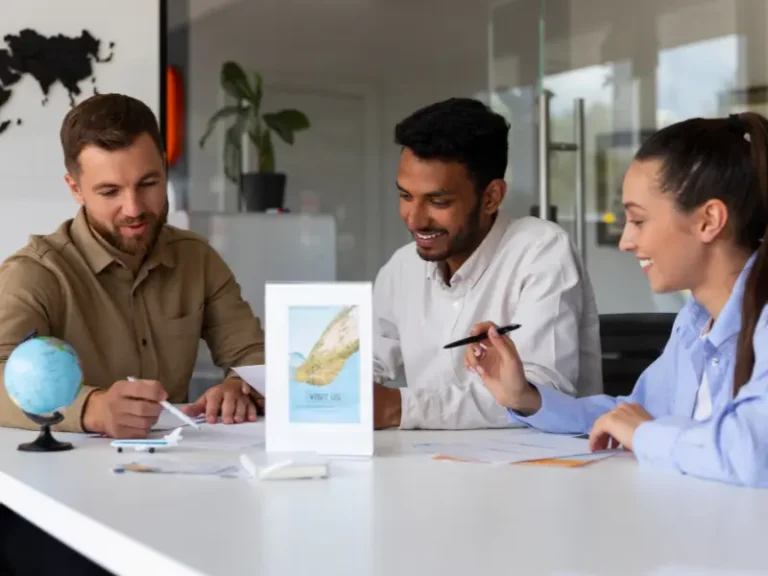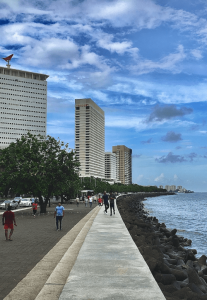How Dubai’s New Golden Visa Program is Shaping Real Estate Investments
The new golden visa programme in Dubai has significantly transformed the investment environment in the UAE, granting long-term residency eligibility to foreigners who invest financially, as entrepreneurs, or as highly skilled professionals. The intention behind this programme is to attract prospective residents from all over the world while effectively stimulating the economy. The golden visa gives individuals the chance to earn residency through investment, especially in real estate. By allowing ownership as a pathway to residency, Dubai’s new Golden Visa programme is massively altering investor behaviour, demand, and the demographics of buyers in high-end areas; it is redefining the types of opportunities available to developers, agents, and investors. It has also changed Dubai’s status as a place to invest, aiming for a secure, tax-effective investment as well as one for the future.
What is Dubai’s Golden Visa?
The new Golden Visa programme from Dubai is a new long-term residency plan that will allow more investors, entrepreneurs, and talent to develop and sustain their projects there. Golden visas differ from standard UAE residency visas, which are not much more than work visas in most cases, but the Golden Visa provides certain independence for qualifying applicants and entitles them to live, work, and study in the UAE.
Essential Programme Information:
● Eligibility –
Real estate investors (AED 2 million minimum), entrepreneurs, scientific researchers, doctors, artists, and students with exceptional ability.
● Categories –
Real estate investors, startup founders, tech professionals, and individuals with specialised talent.
● Duration –
5 or 10 years; automatic renewal.
● Benefits –
Residency security, business autonomy, the ability to sponsor family, and access to premium services.
The Golden Visa assures the opportunity for select projects to succeed, support innovation, and help Dubai continue to grow as a critical function market.
How the Golden Visa is Driving Demand for Real Estate
Dubai’s Golden Visa programme has revolutionised the real estate sector by attracting a new group of international buyers who prioritise returns and lifestyle benefits.
Increased Foreign Investment
A wave of foreign investment into the real estate market has resulted from the promise of long-term residency visas. It has attracted high-net-worth individuals (HNWIs) and expats from India, China, Europe, and Africa, offering favourable circumstances in the property market, not only to purchase but to establish a sustainable base in a stable jurisdiction.
Luxury property growth
The golden visa requires a property investment of AED 2 million or more; thus, the increase in luxury property purchases is expected. The recipients could be developers of large-scale properties, villa owners on Palm Jumeirah, penthouses in Downtown Dubai, and prime waterfront homes at Dubai Marina. Such activity will undoubtedly raise prices and provide a healthy momentum upward in the luxury market.
Impact on the Rental Market
It is also worth noting how the market for rentals is beginning to change from the short-term market demand that other investors with golden visas are comfortable creating versus their long-term residence, which they prefer. With so many mid-range to high-end investment rental properties coming to market, especially at prime locations, there appears to be an ever-expanding appetite for medium- to long-term leaseholding period opportunities or someone opting for year-round occupation. The influx of golden visa holders relocating to the UAE with families has also created a demand for long-term lease options at the higher end of the rental spectrum.
Key Real Estate Areas Benefiting from the Golden Visa
The recently launched Golden Visa programme in Dubai is changing the way we think about and package property in the city. What is in flux are the specific zones that are becoming real hotspots for foreign investment, not just because of the lifestyle or high ROI, but because a whole different buying class is available.
Popular Neighbourhoods:
● Dubai Marina & Palm Jumeirah:
High-end properties alongside stunning sea views and extravagant amenities are enjoyable for buyers in the upward global trend.
● Dubai Downtown:
The tallest building in the world, luxury high-rise residences, preeminent business centres, forward-thinking companies, and hospitality – essentially, anything a potential buyer would wish for is in Downtown Dubai.
● Dubai Creek Harbour:
The latest masterplanned development is a forward-looking lifestyle product and brand new. The Golden Visa programme is attracting individual and developer investors at an alarming rate.
New Developments:
Mega-developments such as Emaar Beachfront, Sobha Hartland, and Tilal Al Ghaf are marketing hands-on while establishing a visa-friendly plan. Developers are also establishing communities that appeal directly to Golden Visa applicants – financially secure investments, attractive lifestyles, and long-term residency eligibility.
Real Estate Investment Opportunities with the Golden Visa
Investment in Dubai’s real estate market has just opened up with the introduction of a new Golden Visa programme, which provides a pathway to high-returning, secure investments.
Investment Thresholds
To qualify for the golden visa, investors only need to either buy a property worth AED 2 million or hold a residential or commercial property leasehold worth AED 2 million. Investments can either be for a single property or multiple properties. Properties must be freehold zoned and be unencumbered or encumbered against a UAE-approved lender (mortgaged).
Long-term returns
The Dubai property market has provided real estate gains and appreciation of 5–7% annually in previous years, with multiple markets benefiting from good long-term price stability. Rental yields in Dubai are proving to be lucrative for investors, and they are yielding around 10%, with short-term and luxury rentals offering even higher returns. Generally, investors enjoying long-term residency are more likely to hold their properties compared to investor tourists, and this can have an impact on price stability.
Tax Benefits and Incentives
Dubai has one of the lowest tax rates globally, with no capital gains tax, property tax, income tax, or rental income tax. This means that investors here have a very fast and favourable return on their investments, which will further contribute to the reported global boost for investors under Dubai’s new Golden Visa programme.
The Role of Developers and Real Estate Agencies in Facilitating Golden Visa Applicants
Developers and agents quickly adapted their marketing approach with the introduction of Dubai’s golden visa programme and started attracting investors from overseas.
Developer Initiatives
Top developers are offering visa processing with the sales of real estate. Developments include details around the Golden Visa criteria from a sales perspective; therefore, the price of the unit, payment plan, and legal documentation reflect the residency guidelines.
Agencies now offer advice
Real estate agencies now also filter significant input into:
● Finding suitable properties that fit the Golden Visa selection criteria.
● Organising the legal document requirements, the due diligence, and the tax requirements.
● Helping buyers prepare the application and the application process for the Golden Visa.
● After-sales services now include leasing/resale support.
They are simplifying the process, lowering buyer risk, and lowering delays for clients who are overseas.
The Economic Impact of the Golden Visa on Dubai’s Real Estate Market
The new golden visa programme for Dubai has created a significant shift in the profile of the real estate and economic landscapes of the city.
A More Stable Market
The visa has drawn long-term, high-quality investors, who aren’t speculators. A stabiliser from market speculation has emerged because it allows buyers and sellers to agree upon sale prices, resulting in stability in the underlying market dynamics for long-term investors. Increased stability is great because it creates a flow between buyers and sellers and a stabilised continuum that mitigates the effects of short-term volatility.
Long-Term Economic Development
The visa is not only drawing in investors for real estate but also start-up founders, entrepreneurs, and skilled workers alike. Such activity allows for new businesses to form, ideas to emerge, and jobs to be created, ultimately forming a new, robust economy that replaces the previous one, with Dubai being the epicentre.
Government Support
Regulatory authorities have introduced a range of streamlined visa policies, digital government services to ensure cost reduction, and changes in the property sector to ensure transparency in their policies. The authorities are continuing to tweak the programme to ensure Dubai remains competitive in the international market.
How to Apply for Dubai’s Golden Visa Through Real Estate Investment
Although the new Golden Visa programme for Dubai is relatively straightforward, do not forget to keep all the documentation in proper order. Here is how the application process works!
Step 1 – Invest in Freehold Property — You will need to invest at least AED 2 million in one or multiple properties.
Step 2– Gather Documentation:
– Valid passport
– Title deed of the property
– Emirates ID (if resident in UAE)
– Proof of health insurance
– Passport-size photo
Step 3– Submission of Application — Application will be through the Dubai Land Department (DLD) and the Federal Authority for Identity and Citizenship (FAIC).
Step 4– Medical Check — A mandatory health check will need to be completed.
Step 5– Consideration Period — Processing all applications usually takes 30-45 days, and then you will get a multiple-entry 6-month visa, and then a long-term visa.
Note: Applicants can sponsor their spouses and children in this programme.
Future Outlook for Dubai’s Real Estate Market Under the Golden Visa Programme
Dubai’s new Golden Visa plan is launching a powerful new wave of real estate growth.
Market Predictions
We anticipate continued pricing increases of 5%–7% per year in the luxury category, along with continued growth in rental yields in prime zones. Off-plan property sales will also grow with a slew of investor-friendly payment options.
Policy Enhancements
Dubai may relax investment thresholds or add visa categories to keep the momentum going. Innovations will offer investors even more value and trust if you are an international investor (green building regulations and digital land registries).
Dubai is also likely to see investors from India, Europe, and more from Africa coming into the landscape, as the UAE is considered a gateway for investors to the Gulf area and beyond.
Conclusion
Dubai’s Golden Visa programme has reshaped the real estate landscape in the emirate. The visa programme has led to growth in the luxury market in particular, while attracting long-term foreign investment. The effect of this new visa programme will be felt not just in terms of economics but also in urban design and urban development for a long time. Dubai not only has created a way of long-term secure residency and incentives to invest, but also an enviable lifestyle positioned to be one of the most sought-after battlegrounds for property investment and development. Investors should look at all opportunities from a long-term investing perspective, hire the right professionals and advisors, and leverage the Golden Visa programme to generate long-term value and growth.
FAQs
1. How much do I need to invest in real estate to qualify for the Golden Visa?
You must invest a minimum of AED 2 million in freehold real estate in Dubai.
2. Can I include my family members in the Golden Visa application?
Yes, you can sponsor your spouse and children under the same visa.
3. What types of properties are eligible for the Golden Visa programme?
Freehold villas, apartments, and off-plan properties (fully paid or mortgaged with UAE banks) are eligible.
4. How long does the Golden Visa last, and can it be renewed?
The visa is valid for 5 or 10 years and is renewable if the eligibility criteria are maintained.



